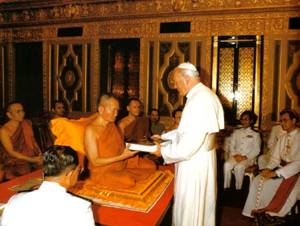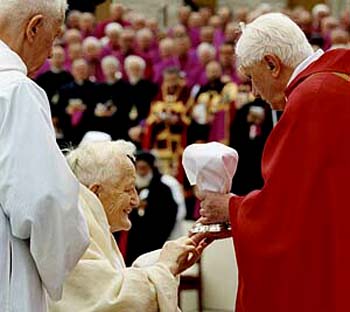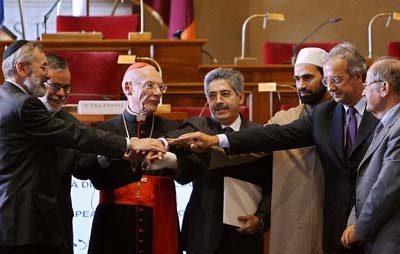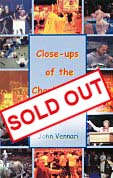 |
Ecumenism
Part I - Commands forbidding all religious intermingling
between Catholics non-Catholics
Modern Ecumenism Condemned by Sacred Scripture
Bishop George Hay
Bishop George Hay (1729-1811) from Scotland was one of the greatest Catholic teachers and apologists of the early 19th century. His three famous books are The Sincere Christian, The Devout Christian, and The Pious Christian (all out of print).
Bishop Hay was a formidable opponent of Liberalism, and his works have received high praise from numerous Catholic Bishops of the 19th century. Paul Cardinal Cullen said: "The learned Bishop's writings display a great power of reasoning, and great critical acumen, while they supply an inexhaustible mine of erudition and Scriptural knowledge."
What follows is taken from pages 548 to 556 of his magnificent book, The Sincere Christian. After a masterful explanation from the Holy Bible that there is no salvation outside the Catholic Church, (1) Bishop Hay demonstrates that Sacred Scripture absolutely and infallibly forbids all religious intermingling between Catholics and those of false religions. Indeed, Bishop Hay here sounds the death knell for modern ecumenism, since ecumenism, as well as the Charismatic Movement, are squarely based on interfaith principles solemnly condemned by Sacred Scripture - a condemnation that no authority in the Church can overrule.
John Vennari, Catholic Family News editor
This article was published in CFN, May 2008
Prohibition of all communication in Religion with those of a false religions
Q. What are God's laws which prohibit this in general?
A. They are principally these following:
The first is grounded upon the light in which all false religions are considered in the Holy Scripture; for there we are assured that they arise from false teachers, who are called seducers of the people, ravenous wolves, false prophets, who speak perverse things: that they are anti-Christs, and enemies of the cross of Christ; that, departing from the true faith of Christ, they give heed to the spirits of error; that their doctrines are the doctrines of devils, speaking lies; that their ways are pernicious, their heresies damnable, and the like.

JPII enters a Buddhist temple in Bangkok and pays homage to a Buddhist high priest - May 1984 |
In consequence of which, this general command of avoiding all communication with them in religion is given by the Apostle: "Bear not the yoke together with unbelievers; for what participation hath justice with injustice? Or what fellowship hath light with darkness? And what concord hath Christ with Belial? Or what part hath the faithful with the unbelievers? or what agreement hath the temple of God with idols? For ye are the temple of the living God." (2 Cor. 6:14)
Now it is the true religion of Jesus Christ, the true doctrine of His Gospel, that is justice and light. All false doctrines are injustice and darkness. It is by our Holy Faith that we belong to Christ, and are temples of the living God. All false religions flow from the father of lies, and make those who embrace them unbelievers. Therefore, all participation, all fellowship, all communication with false religions is here expressly forbidden by the Word of God.
We have seen above (2) that we are obliged to love the persons of those who are engaged in false religions, to wish them well, and to do them good; but here we are expressly forbidden all communication in their religion - that is, in their false tenets, and worship. Hence the learned and pious English divines who published at Rheims their translation of the New Testament, in their note upon this passage, say: "Generally, here is forbidden conversation and dealing with unbelievers in prayers, or meetings at their schismatical service, or other divine office whatsoever; which the Apostle here speaks of in more particular terms, that Christian people may take the better heed of it."
Avoid all religious communication with heretics
The second general command to avoid all religious communication with those who are heretics, or have a false religion, is this: "A man who is a heretic, after the first and second admonition, avoid; knowing that he that is such a one is subverted, and sins, being condemned by his own judgment" (Tit. 3:10).

In the Mass for JPII (April 2005), Card. Ratzinger gives Holy Communion to Protestant brother Schutz |
Here we see another general command to avoid all such heretics - that is, to flee from them, to have no communication with them. But in what are we commanded to flee from them? Not as to their persons, or the necessary communications of society; for then, as the same holy Apostle says upon a similar occasion, "You must needs go out of the world" (1 Cor. 5:10.) Not as to the offices of Christian charity; for these we are commanded by Christ himself, in the person of the good Samaritan, to give to all mankind, whatever their religion be.
Therefore, in the most restricted and limited sense which the words can bear, the thing in which we are commanded to avoid them is in all matters of religion; in that in which they themselves are subverted and sin; in things relating to God and His service. In these they err, in these they are subverted, in these they are condemned; therefore in these we must avoid them.
Hence the pious translators of the Rheims New Testament, in their note on this text, say, "Heretics, therefore, must not wonder if we warn all Catholics, by the words of the Apostle in this place, to take heed of them, and to shun their preachings, books, and religious meetings."
Withdraw from meetings and prayers of all the false sects
A third general command on this subject is manifestly included in this zealous injunction of the Apostle: "We charge you, brethren, in the name of Our Lord Jesus Christ, that you withdraw yourselves from every brother walking disorderly, and not according to the tradition which they have received from us" (2 Thes. 3:6).
In this passage, all the different sects of false religions are particularly pointed out; for, however they may differ in other respects they generally agree in this, of rejecting apostolic traditions handed down to us by the Church of Christ. So the Apostle here charges us, in the name of Our Lord Jesus Christ, to avoid all such - to withdraw ourselves from them.

In Rome's Grand Mosque, Card. Poupard meets with Jewish and Muslim religious leaders - September 2006 |
Now it is evident that the most limited sense in which this command, so ardently laid on us by the Apostle, can be taken, is to withdraw ourselves from them in everything relating to religion - from their sacraments, prayers, preachings, religious meetings, and the like. It is in these things that they "do not walk according to the tradition received from the Apostles." In these things, then, we are here commanded, in the name of Christ Himself, "to withdraw ourselves from them."
Seeing, therefore, that the Holy Ghost, by the mouth of this holy Apostle, has so often, and in such strong terms, forbidden all manner of fellowship in religion with those who are out of His Holy Church, let us not be deceived by the specious but vain sophistry of cunning men, who lie in wait to deceive. Let us not offend our God, by transgressing these His express commands, by joining in the prayers or going to the meetings of such as are separated from His Holy Church, lest He should withdraw His holy grace from us, and as we expose ourselves to the danger, leave us to perish in it.
Let us hear and follow the advice and command of the same holy Apostle: "As therefore ye have received Jesus Christ the Lord, walk ye in Him; rooted and built up in Him, and confirmed in the faith; as also ye have learned, abounding in Him in thanksgiving. Beware lest any man impose upon you by philosophy and vain deceit according to the tradition of men, according to the rudiments of the world, and not according to Christ" (Col. 2:6).
Therefore, to all those arguments which may be brought from human, worldly or interested motives, to induce us to join in or to partake of any religious duty with those of a false religion, though in appearance only, we ought to oppose them with this one: "God has expressly forbidden it, therefore no human power can make it lawful."
1. The Sincere Christian,Dublin: James Duffey and Son, pp. 474-533.
2. Ibid.

Posted June 9, 2008
Continued

Related Topics of Interest
 Ecumenical Chapel at St. Paul Outside the Walls Ecumenical Chapel at St. Paul Outside the Walls
 Brother Schultz Died a Protestant Brother Schultz Died a Protestant
 Pictures of a Desecration at Fatima Pictures of a Desecration at Fatima
 Please Don't Call Protestants Christians Please Don't Call Protestants Christians
 JPII Kisses the Hand of Rowan Williams, Head of the Anglican Sect JPII Kisses the Hand of Rowan Williams, Head of the Anglican Sect
 Praying with Heretics - Where is the Resistance? Praying with Heretics - Where is the Resistance?


|
Ecumenism | Hot Topics | Home | Books | CDs | Search | Contact Us | Donate
 © 2002-
Tradition in Action, Inc. All Rights Reserved
© 2002-
Tradition in Action, Inc. All Rights Reserved
|
 |
|